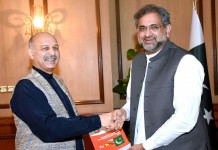ISLAMABAD, Jun 30 (APP):JazzCash is not just about transactions; it’s about transformation and the fintech platform is driving a shift from a cash-based economy to a digital one, contributing to the vision of the State Bank of Pakistan and the government in digitizing the economy.
Over a decade ago, JazzCash started with two simple products: utility bill payments and domestic remittances said a news release.
It has evolved into a comprehensive fintech platform offering services from nano-lending, savings to insurance, all while committed to expanding financial services to underserved segments of society these views were shared by Aamir Ibrahim, CEO of Jazz, addressing investors from around the world at the VEON Capital Markets Day 2024.
Aamir highlighted that Pakistan remains a predominantly cash-based society, presenting a significant digital opportunity. JazzCash currently has over 300,000 locations where QR codes are accepted, with an ambitious goal to increase this number to 1 million within the next two years.
Pakistan is home to approximately 3 million micros, small, and medium enterprises (MSMEs), and JazzCash aims to digitize their transactions. The platform processes over 100,000 micro loans daily, providing a crucial financial tool for MSMEs, which are the backbone of Pakistan’s economy but have historically had limited access to formal financial sources. JazzCash’s extensive network allows it to digitize over PKR 100 billion each month, serving a customer base of 44 million, with women making up 30% of this clientele.
To improve women’s access to financial services, Aamir reiterated JazzCash’s commitment to increase it to 50% in the next few years. The platform’s initial success amongst females is due to convenience. They are less likely to visit banks in Pakistan, while JazzCash provides them with easy, quick, and secure digital financial services from the comfort of their homes,” he added.
Another reason for JazzCash’s success has been the vast agent network spread throughout cities, towns, and rural localities. “Our vast footprint, especially in areas without brick-and-mortar banks, allows us to provide the underserved with basic financial services, onboarding new customers and educating millions on the benefits of mobile money,” he further said.
“We are also working to increase the number of female agents significantly. By inducting more female agents, we aim to foster a psychologically safe environment for females to transact conveniently. This will also open up new earning models for them as mobile money can be an attractive business for dedicated agents.”
Beyond payments, JazzCash is a major force in financial inclusion, facilitating over 8 million digital loans in the first quarter of this year alone. These nano loans, typically between $20 to $30, are designed to be productive. Aamir illustrated the impact of JazzCash’s digital lending with the story of a rickshaw driver who uses the ReadyCash service to secure small loans that keep his operations running smoothly. With fares collected, he easily repays these loans, ensuring a seamless cycle of financial empowerment.
Aamir also commended the collaborative efforts of the State Bank of Pakistan, the Pakistan Telecommunication Authority, and the Securities & Exchange Commission of Pakistan in balancing innovation and consumer protection, thus propelling digital and financial inclusion nationwide.
Looking ahead, JazzCash will focus on interoperability, tokenization, and B2B solutions over the next five years. “With a large unbanked population and a cash-dependent SME sector, we anticipate exponential growth,” Aamir said. “Our roadmap involves leveraging data for risk assessment, venturing into Insurtech, and further integrating financial services into everyday transactions.”
In his concluding remarks, Aamir discussed the expanding array of digital capabilities and services offered by VEON, the parent company of Jazz and Mobilink Microfinance Bank Limited, aimed at accelerating digital and financial inclusion across its markets.
مضمون کا ماخذ : کینڈی کیش














